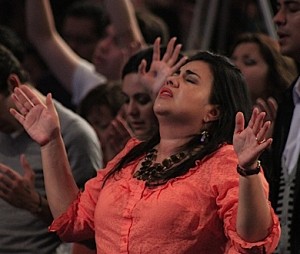 In Walking in the Dust of Rabbi Jesus I talked about Christian individualism. Our tradition greatly emphasizes the idea of isolating ourselves in order to experience God’s presence, whereas Judaism emphasizes community.
In Walking in the Dust of Rabbi Jesus I talked about Christian individualism. Our tradition greatly emphasizes the idea of isolating ourselves in order to experience God’s presence, whereas Judaism emphasizes community.
Many Jewish prayers speak to God as “we” rather than “I.” Their daily morning prayers actually require a minyan, the presence of at least ten men, even to be prayed! To them, praying together isn’t optional, it’s a necessity. Jesus, too, framed prayer in plural terms, telling us to address God as “Our Father…”
But contemporary Christians especially like to focus on God and me. In the book I shared about a large Christian service I attended where that was the focus of every song:
 “I love you Lord, and I lift my voice,”…
“I love you Lord, and I lift my voice,”…
“Just as I am, without one plea,” …
“Here I come to worship, here I come to bow down…”
Hundreds of us were worshiping side by side, a sea of voices resounding together, and every one of us was pretending to be all alone! (Walking, page 57)
It’s ironic that I experienced just the opposite culture clash at one of the first Hebraic services I attended many years ago. Everybody except me seemed to know the words to a lovely, rhythmic Hebrew tune, which we chanted over and over:
hi-nei mah tov u-mah na-yeem, shevet achim gam yachad
hi-nei mah tov u-mah na-yeem, shevet achim gam yachad
We clapped in time and occasionally broke into a chorus of “lai-lai-lai-lai-lai-lai-lai-lai-lai-lai.” Finally, we sang this mysterious line in English. Its words caught me by surprise:
“Behold how good and how pleasant it is when brothers dwell together in unity.”
Wow! I’ve never sung anything like this before, I thought. This was definitely not a song written by a Christian praise team. For a moment I even wondered if it was appropriate for a service. Where was God in these words?
Later I learned that Hinei Ma Tov is a traditional Jewish hymn that is quite biblical. It is a quote directly out of Psalm 133:
How good and pleasant it is when brothers live together in unity! … It is as if the dew of Hermon were falling on Mount Zion. For there the LORD bestows his blessing, even life forevermore. (Psalm 133: 1, 3)
The point of this song is to rejoice in the community that God has provided for us. We are praising God for giving us to each other! And we are doing it by singing together. It’s ironic what a polar opposite Hinei Ma Tov is to individualized Christian worship. There’s no “God and me” anywhere!
In a very Jewish way, we were expressing our joy for something that Jesus prayed for. We were praising God for unity — the love of God in Christ that expresses itself between believers:
My prayer is not for them alone. I pray also for those who will believe in me through their message, that all of them may be one, Father, just as you are in me and I am in you… May they be brought to complete unity to let the world know that you sent me and have loved them even as you have loved me. (John 17: 20-21, 23)
~~~~
(You can listen to Hinei Ma Tov at a Paul Wilbur concert below:)
(Images: jmrichards, Ministerios Cash Luna)
(For the ultimate in God and me worship, see this link… it’s pretty funny)
Sandra King says
I agree that Christians don’t sing and worship with “we” much. It is true that God intends that we are a community–commune in unity. I pray that somehow God let’s us know how important His family is to Him and should be to each other. We are to blend together as one in our giftings, praise, worship, work and community of believers. As Jesus and the Father were one in love, will and purpose, we are to be one in love for Jesus and each other. God sees those who love and follow His Son as one person. He created one Man in the beginning and we will be one Man in the end with Jesus as the Head. As His family, every member of the family is loved no more or less than the other. We need to do the same. God is no respecter of persons–each are special and unique to Him and has a purpose that only he or she can accomplish for God. Each of us may be the only person who can touch a particular person with God’s love and grace.
As Adam was lovingly shaped and formed by the Godhead with every member of his body put in the proper place so he would operate fully and harmoniously, God places people in His Body as it pleases Him so we will operate as one Man (Body) as we worship, love and serve God and others. I pray that one day Christ’s Body will understand this so we can do a tremendous work for Him.
deslin broomes says
a strange concept to me….a community response to each other and to God instead of a personal individual truth celebrated. Will have to look at this arm of worship. Thanks for bringing it to my attention.
Lois Tverberg says
Thanks, Sandra and Deslin. I agree – I had never imagined singing a psalm celebrating the love God had given me for the community around me.
Lauren Westendorp says
This is something I have noticed in recent worship services as well. This individualism in worship is something that is a result of the individualism in western culture. We as a culture have adopted the idea that our faith is our own business and is something private that should be kept to ourselves. I think it’s important for us to remember that this is now how faith is intended to be. It is, indeed, intended to be something shared by the community. This is why we should try to refocus our worship services to be less about “God and me” and more about worshipping as a community.
James Westenbroek says
An interesting thought, Louis. I think that as far as worship goes, it can be an extremely personal experience, yet at the same time a great communal experience, so in that sense worshiping “alone” together is possible. I really enjoyed your perspective, and the idea that for Jews worshiping in community is so important, and the fact the Christian hymns use “I” much more than they use we.